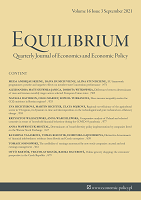Technological progress spillover effect in Lithuanian manufacturing industry
Technological progress spillover effect in Lithuanian manufacturing industry
Author(s): Mantas Markauskas, Asta BaliuteSubject(s): National Economy, Business Economy / Management, Economic development
Published by: Instytut Badań Gospodarczych
Keywords: technological progress; agent-based modelling; intersectoral technological progress spillover; manufacturing industry; economic development;
Summary/Abstract: Research background: Various methods for technological progress assessment and evaluation exist in the context of economic development. Each of the methods possesses distinct advantages and disadvantages in analysis of technological progress fluctuations. For most neoclassical growth theories, technological progress measures are included as exogenous variables, thus excluding evaluation of factors influencing technological progress variation throughout time. Purpose of the article: The aim of this article is to offer improvements on classical technological progress evaluation methodologies for manufacturing industries, separating effect of intersectoral technological progress spillover effect from internal factors influencing technological progress growth and perform analysis in the case of Lithuanian manufacturing industry. Methods: Earlier research papers used linear time series regression and vector autoregression methods to assess technological progress values and define equations explaining effect of different manufacturing level indicators on technological progress measure growth. This research paper uses results of previously mentioned methods and performs simulation analysis applying agent-based modelling framework. Findings & value added: The conducted vector autoregression analysis has showed that two variables which influence technological progress most significantly are labor productivity measure and gross profit value. Sensitivity analysis emphasizes that effect of these two variables on technological progress growth is substantially different. Increase in gross profit value affects technological progress growth for wider range of sectors from Lithuanian manufacturing industry (15 out of 18 analyzed sectors - technological progress measure values are affected by changes in gross profit, while changes in labor productivity influence technological progress values in the case of 9 sectors). Rising gross profit values also produce intersectoral technological progress spillover effect more significantly, while growth in labor productivity measure has stronger effect on technological progress fluctuations for sectors which are able to exploit this effect. Presented research suggests improved methodology for intersectoral technological progress spillover effect assessment in the context of manufacturing industries.
Journal: Equilibrium. Quarterly Journal of Economics and Economic Policy
- Issue Year: 16/2021
- Issue No: 4
- Page Range: 783-806
- Page Count: 24
- Language: English

